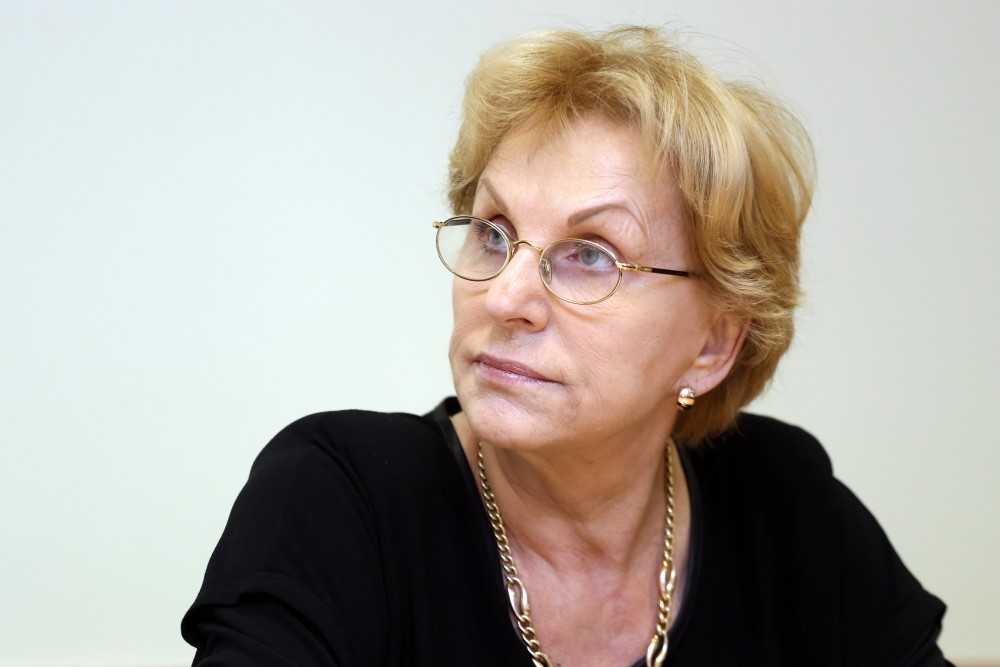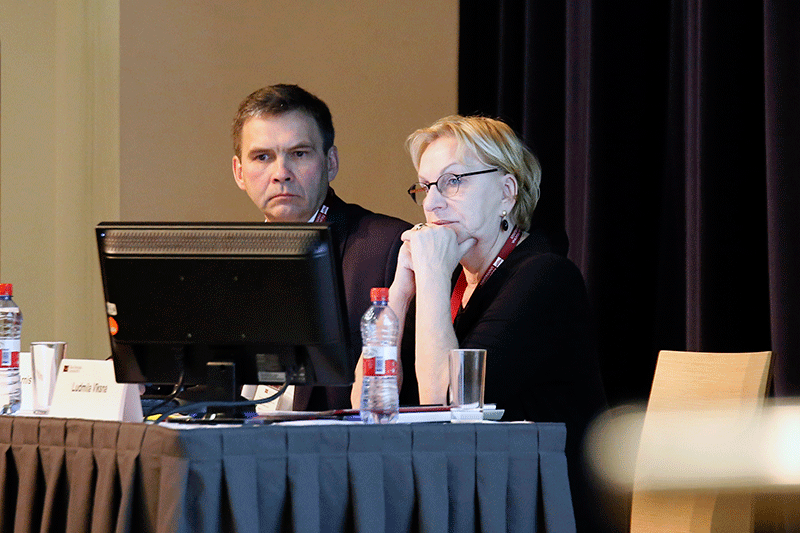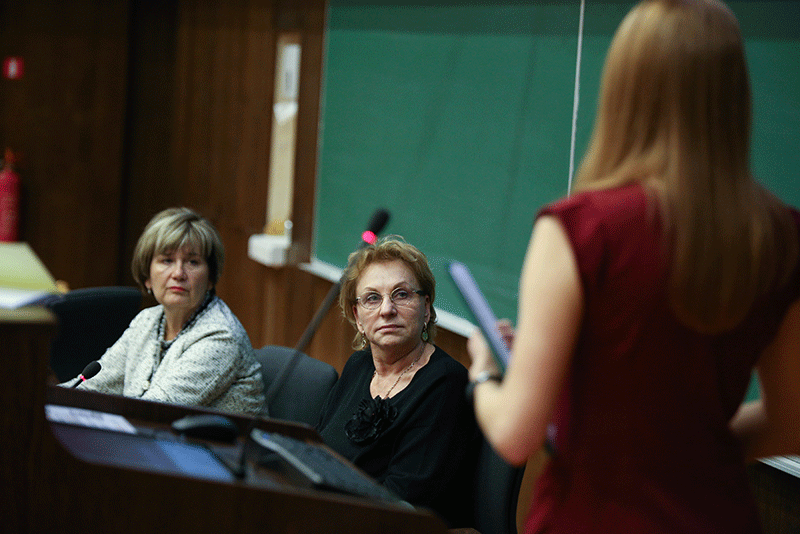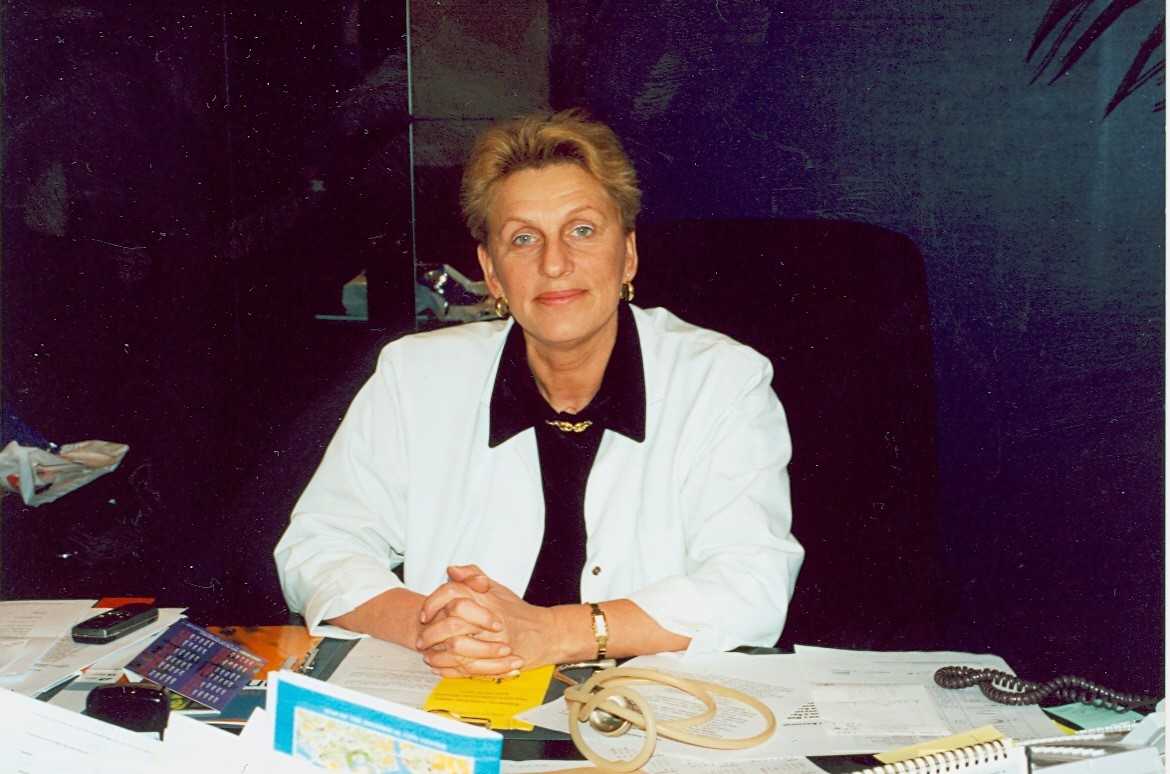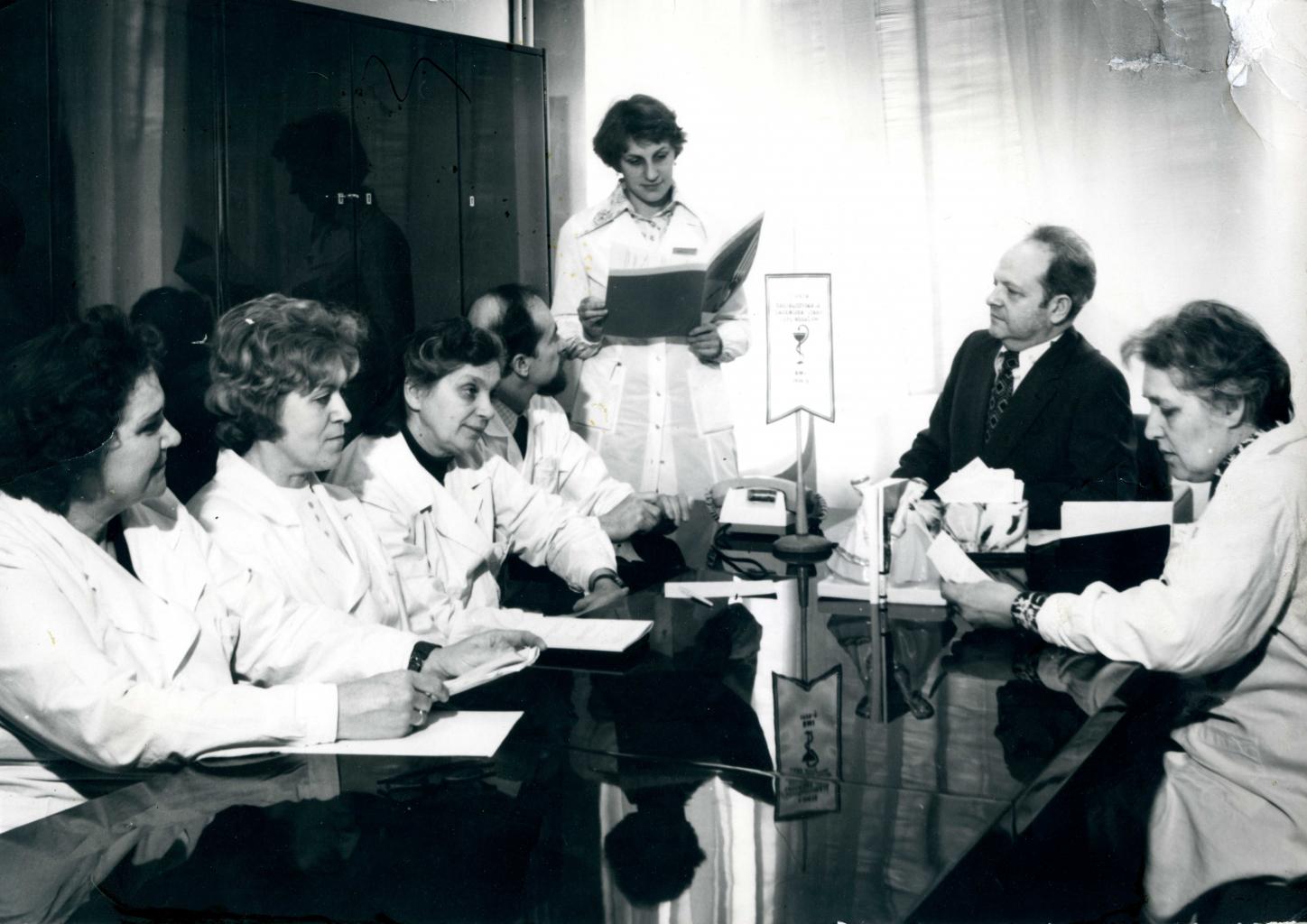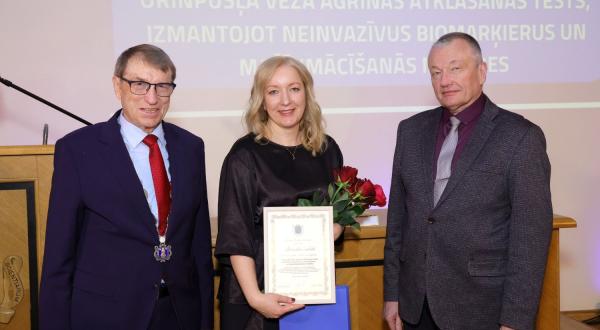Infectologist Professor Ludmila Vīksna: I Feel Best When I Have a Lot of Work
Professor Ludmila Vīksna, Head of the Rīga Stradiņš University (RSU) Department of Infectology, has worked at RSU since 1971 conducting research as well as pedagogical and administrative duties. The professor is open and straightforward, she gives praise easily, but can also be strict when necessary. The quality she deems most important in her work as well as in her relationships is honesty.
Born in Riga, Prof. Vīksna graduated from high school with a major in mathematics, but wanted to change directions and enrolled in the Riga Medical Institute (today RSU), proving her relatives who had claimed that girls don’t get accepted into the institute wrong. Her drive came from ‘a youthful misunderstanding about the course and order of things. I was actually interested in philology, but my family said it wasn’t a serious enough subject,’ laughs the Professor.
In order to get a doctoral degree in the 1970s, Prof. Vīksna had to defend two dissertations - the first proved that the young student was able to conduct research and had made at least one discovery, but the second dissertation had to be done independently from beginning to end without a supervisor. Both dissertations were related to hepatology, or liver diseases.
‘I chose infectology because everything seemed clear to me there - a pathogen is found in the laboratory, then there is medicine and I treat the patient, and no one dies. A very good speciality!’ recalls the {rofessor, who has become the main infectology specialist at the Riga East Clinical University Hospital.
She is currently one of the experts helping to limit the spread of COVID-19 and informing Latvians about how the novel coronavirus “behaves” and how to avoid getting infected.
‘It is clear that almost all of us will sooner or later become infected with COVID-19, but the more gradually this happens, the better,’ Prof. Vīksna reminds us.
What gives you strength and energy in these dark and difficult times?
I think that infectologists thrive when they have a lot of work to do, because infectology is an industry that constantly requires caution and a readiness to fight or to work, so to speak. This is our default condition. Before the COVID-19 pandemic, there was some peace among infectologists around the world, as there didn’t seem to be any outbreaks of infectious diseases. But the world, as we now see, is governed by nature and natural laws alone! One virus has changed all of our lives entirely including the world order. Nothing else can affect the whole world this much, even the effects of an atomic bomb would be more local. Nothing like that has happened for about a century.
What lesson can nature teach the world?
Every new epidemic, every new pathogen that we discover, every new drug or new vaccine is something that drives development. Right now, nobody remains unaffected by the coronavirus!
The whole world was like in a big, aimless race – many travelled with new-born babies, forgot about their safety, or constantly travelled for business. The crisis has also highlighted excessive bureaucracy at work. Values have now changed – mountains of paperwork and endless meetings are being thought about differently and everything happens more meaningfully, people are not travelling or running around without good reason.
Communication is necessary in both science and education, but we are currently on a break to reflect and reassess, and as a result we will live in a new “normal”.
On 2 November 2019 Prof. Ludmila Vīksna organised the conference Medical Academic Approach to Beauty and Vitality for Years, which was held in the RSU Great Hall
You are currently leading a national research programme on mitigating the effects of COVID-19 - Clinical, Biochemical, Immunogenetic Paradigms of COVID-19 Infection and Their Correlation With Socio-Demographic, Aetiological, Pathogenetic, Diagnostic, Therapeutically and Prognostically Relevant Factors Included in the Guidelines. What are the study’s conclusions so far?
I am working in the medical section of this project and deal with patients. We have achieved a lot even though the study was only granted six months, which is an extremely short period of time, meaning it ends in December.
We have identified possible risk factors that determine whether the course of the disease will be severe. Surveys of patients who had contracted COVID-19 in the spring showed that almost all of them suffered more or less severe long-term effects after getting healthy.
After the illness, some patients show damage to the nervous system, presenting as headaches or dizziness, others have suffered damage to the endocrine system, or the liver. We will only be able to judge whether this virus’s effects are temporary or permanent after some time has passed. We have also discovered that antibodies are not as common in children as we had hoped. We have also made significant discoveries about the amount of time that the virus is present in the human body, specifically in the intestinal tract.
RSU Research Week is scheduled to take place in spring 2021. Are you going to participate, and if so, how?
I highly valued the previous RSU conference, which took place over the course of several days and was attended by a large number of participants, and I have high hopes for the next edition. A large infectology section has been established at the 2021 conference, which is headed by Prof. Modra Murovska.
It is a great opportunity to inform a wider audience about the results of our research. What we will have researched about COVID-19 will not stay here in Latvia, but will be shared with our peers in Europe and the world. They will then be able to conduct further research based on our studies. It is often in such conferences that ideas for new fields of research emerge.
I really hope that RSU will create its own scientific journal, something that is currently being discussed. Maybe the RSU scientific conference will lay the foundations for a journal like this and hopefully it could be a journal for all three Baltic countries.
I also want to say that I highly valued the previous RSU International Student Conferences and I am convinced that the upcoming conference, which will take place during Research Week 2021, will be just as appealing and well-organised as before. I have participated in the jury at the student conference, so I can safely say that our students are very good organisers, and that we can be proud of them!
Prof. Ludmila Vīksna on 17 March 2016 together with Prof. Dace Gardovska leading a section at the RSU conference.
What should students who want to go into research keep in mind?
Students who want to focus on research should be curious and know what it is that they want to study. You need to have internal drive!
As in the spring, studies at now taking place remotely at RSU. How is the Department of Infectology doing in providing remote studies?
The Department of Infectology is technically oriented and knowledgeable, and we have a very responsive and qualified support staff who are familiar with new technologies. Without this transitioning to remote studies would have been difficult.
Infectologists are generally very disciplined people because the specialisation requires this trait, so we were able to switch to remote studies very quickly, because we had many video lectures recorded before the pandemic. The teaching material that we give to students would be revised and improved from time to time.
As access to patients has become more and more limited in recent years because a patient rarely allows students to participate in the visit, we had already been using images, videos and role-play in the study process for a long time. Even before COVID-19, we actively used modern technologies, for example, students have had to submit their independent papers electronically via the RSU e-learning platform before the pandemic. Therefore, we were somewhat ready for the changes that the novel coronavirus introduced to the study process.
Of course, our colleagues are still learning from one another about how to improve and enhance the remote study process. And it’s not like we can just ask students to study a specific topic and they go off and do it. We retain control both in the middle and at the end of the lesson. You can’t do it without control! It mobilises both students and lecturers.
Ludmila Vīksna around 1996 at 3 Linezera iela. Photo from the RSU Museum collection
Prospective doctors cannot learn without getting to know patients in real life, so at the department we have created an opportunity for students to work with the lecturer for at least two hours during patient admission. Students must register for specific time slots in advance and follow all epidemiological as well as patient data protection regulations. This is an unprecedented opportunity, because usually, if they allow it, patients are visited and examined by a whole group of about 10 students. This is not the same as a one-on-one visit. We offer 76 specific times per month in a schedule for when students can come and work with a lecturer at the reception. It turns out that students have not actually used this opportunity as often as we anticipated - only 27 international and seven local students applied. RSU has provided them with access to patients, but then the students do not take advantage of it - I don’t understand that! When we created this opportunity, I thought that we would be flooded with eager students, but no... It’s a shame!
Maybe students don’t apply because they are afraid of COVID-19?
Those who are afraid of sick people are not fit to become doctors! I have always said that. They should study another profession instead.
What is the mood of your students and colleagues during these stressful times?
Although doctors are exhausted in the evenings, we are alert during the day due to the heavy work load. Our colleagues have observed that students have become more apathetic during remote lessons, however. They clearly want to communicate with their lecturers and peers in person.
The new restrictions that are currently in place have affected everyone of course. If the situation continues for much longer, my peers might burn out.
I would like to add that the my colleague’s support is very meaningful in this emotionally stressful time. This is also evidenced by the results of our recent survey, COVID and Us, related to work during COVID-19. The survey was done at the Riga East Clinical University Hospital, which is where the clinical base of the Department of Infectology is located.
What are your memories of your time as a student? Were you a conscientious or a misbehaved student?
I was an average student... I really liked the clinical study courses and I didn’t like the ones where the teachers couldn’t teach the subject logically. Since I think mathematically, I always wanted to understand the cause and effect.
In my time, most of the teachers were memorable personalities and professionals. Students could come and talk to the lecturers all afternoon and even in the evening. Patients were responsive and allowed students to examine them. Many things were different then...
The youngest research associate Ludmila Vīksna (standing) in 1975 at a meeting of the Department of Infectology and Epidemiology. From the left: Asst. Anna Šmite, Asst. Prof. Ņina Sumļaņinova, Asst. Prof. Lilija Briede, Asst. Prof. Ivans Golobovs, Prof. Anatolijs Bļugers, Asst. Prof. Emīlija Kibitkina. Photo from the RSU Museum collection
Which teachers have been most memorable?
In my profession it was definitely Prof. Anatolijs Bļugers and to a large extent also Prof. Jūlijs Anšelevičs. I remember many of my teachers with fondness. Life teachers? The same Prof. Anatolijs Bļugers. He taught me many things that I still adhere to. Being honest with your patients was one of them.
Do you have any Christmas and New Year’s traditions in the Department of Infectology?
One of the traditions we have had for almost 10 years has been that the children of the department’s staff draw greeting cards that we send to our friends, colleagues and cooperation partners. It sounds like a small gesture, but our colleagues and their children anticipate this tradition year after year. We display all the drawings and none of them ever remains unsent as a greeting card.
How do you celebrate the holidays yourself?
I celebrate Christmas at home. I prefer a quiet Christmas. On New Year’s Eve I usually go to a restaurant with friends. This is out of the question this year, of course. Even if it were allowed, I would not go anywhere, because I believe that we must be very careful and avoid large gatherings.
What is a gift that would make you happy?
With time, material gifts are no longer as important. It is no longer like in childhood or adolescence when you want this, or that... I don’t know if it can be considered a gift, but I wouldn’t want to lose people’s respect.
Also… A few days ago I realised that I really miss live, classical, high quality music.
Facts about Prof. Ludmila Vīksna
- 1971: obtained a Medical Doctor’s Diploma at the Riga Medical Institute.
- 1979: Dr. med.
- 1992: Dr. habil. med.
- RSU Professor since 1992
- Research areas: infectology and hepatology.
- Head of the Department of Infectology, Faculty of Medicine since 1991.
Corresponding member of the Latvian Academy of Sciences. - Chief specialist in infectology at Riga East Clinical University Hospital since 2012.
- Author and co-author of several books, brochures and monographs.
Has created and led 15 study courses as well as has been the supervisor of 10 successfully defended doctoral theses. - Participates in and manages several Latvian international research projects.
Member and leader of many Latvian and international professional organisations. - Author and co-author of various inventions, trademarks, designs, and patents.
Author of dozens of internationally cited publications. - In 2013, Rīga Stradiņš University started a series of interviews We are proud!. These are conversations with our colleagues, students and graduates who have made a discovery or have had significant achievements in research, have been widely recognised for their work or received an award.
